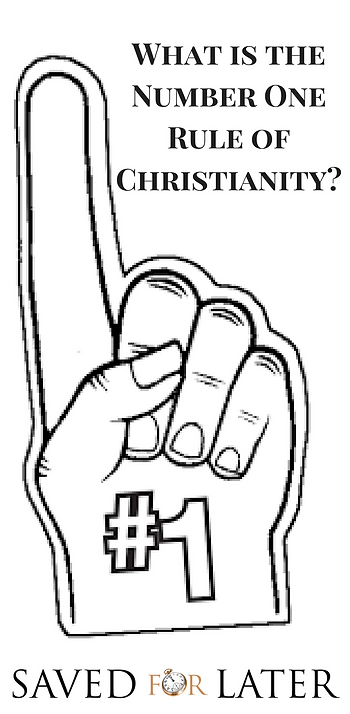Even though I was an atheist until I was in my 40s, I suppose I always appreciated the Ten Commandments. Without them, it would be okay to kill, cheat on our spouses, and take whatever we wanted regardless of who it belonged to.
Not to mention, I couldn’t help but be impressed by the high percentage of commandments I felt I could keep.
Let me set the mood a bit.
When Jesus came onto the scene, He wasn’t quite what they all were hoping for. They expected someone a little more regal to appear, leading them to a military victory against their occupiers, the Romans.

Jesus walked all over Jerusalem, taught the people in the streets and the temple, and drew quite a crowd. The fact that this ‘impostor’ was drawing such a crowd angered the religious leaders, so they followed Jesus around and tried to hopefully expose a weakness in His knowledge of the Law and the Prophets, often with some difficult theological questions.
The number 1 rule of Christianity
“Teacher, which is the greatest commandment in the Law?” (Matthew 22:36)
“Jesus replied: ‘Love the Lord your God with all your heart and with all your soul and with all your mind. This is the first and greatest commandment. And the second is like it: Love your neighbor as yourself. All the Law and the Prophets hang on these two commandments.’” (Matthew 22:37-40)

When Jesus gave His answer, the one answer was in two parts:
- love the Lord with all you’ve got
- love your neighbor as yourself
But how?
Do you see the pattern?
Every instruction to us is covered by a love for God and a love for our neighbor.
All teaching given to us, all biblical counsel, covers one of those two things. Just so there wouldn’t be any confusion, Jesus also threw “your enemy” into the neighbor mix (Matthew 5:44).
What these things both have in common is love.
If one wanted to, he could boil down all of Scripture to this one element… love. If the character trait you lead with is love, then all other character traits are subordinate to it.
Notice that I said character trait, not emotion. Jesus did not say to have heartfelt warm fuzzies well up inside you for your neighbor like you do for your husband. He didn’t say to buy flowers for your boss who just fired you or more jewelry for your girlfriend who just dumped you. He said to love them as yourself.
What then, Jesus? How do we love our neighbor?
“So whatever you wish that others would do to you, do also to them, for this is the Law and the Prophets.“ (Matthew 7:12)

I can tell you from experience that many a marriage therapist will tell you that love for your spouse – as an emotion – fades, thus ending so many marriages. Love for your spouse – as a character trait – often referred to as a “conscious choice,” must often be deployed despite emotions to the contrary. When this conscious choice is present, marriages succeed. It is no different with love for God or your fellow man.
Then why don’t I hear more Christian leaders suggest the same thing?
The Bible, we will learn, gives quite a bit of advice to avoid false teachers and false prophets (Jeremiah 23:26; Matthew 7:11; 24:11; 2 Timothy 4:3; Romans 16:18; 2 Corinthians 11:13-15; 2 Peter 2:1; 1 John 4:1).
I’ll be honest: when I first noticed the theme of guarding yourself against the wolves in sheep’s clothing (the sheep’s clothing is that of a Christian), I wanted to pull the covers over my head like a little kid spending his first night in a tent. Thankfully, we have the Word of God on how to do such a thing.
Scripture quotations are from the ESV® Bible (The Holy Bible, English Standard Version®), copyright © 2001 by Crossway, a publishing ministry of Good News Publishers. Used by permission. All rights reserved.

